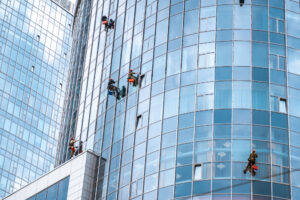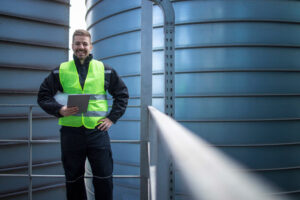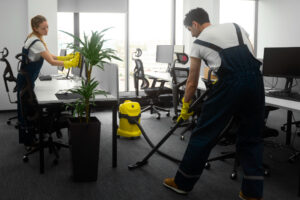Introduction
Facility management is a critical aspect of modern business operations, encompassing various disciplines and practices aimed at maintaining and optimizing the built environment to support an organization’s core functions. In the United Arab Emirates (UAE), a country known for its rapid economic development and cutting-edge infrastructure, facility management plays a pivotal role in ensuring the efficiency, sustainability, and safety of diverse facilities, ranging from commercial buildings to residential complexes. This article provides a comprehensive overview of facility management, delving into its definition, key components, importance, and specific applications in the context of the UAE.
What is Facility Management?
Facility management, often abbreviated as FM, can be defined as a multifaceted discipline that involves the efficient and effective management of an organization’s physical assets and infrastructure. These assets may encompass buildings, equipment, systems, and even people to some extent. The primary objective of facility management is to create and maintain a safe, functional, and conducive environment that supports the organization’s core activities while optimizing resource utilization.
Key Components of Facility Management
Facility management comprises several key components and areas of responsibility, each contributing to the overall success of the discipline. These components include:
- Space Management: This involves planning and optimizing the allocation of physical space within facilities. Effective space management can improve workplace productivity, reduce operational costs, and enhance the overall employee experience.
- Property Management: Property management focuses on the maintenance and management of real estate assets. This includes tasks such as lease management, property valuation, and tenant relations.
- Maintenance and Operations: Maintenance is a crucial aspect of facility management, involving the upkeep and repair of physical assets. Preventive maintenance helps prevent breakdowns, reduce downtime, and extend the lifespan of equipment and facilities.
- Health and Safety: Ensuring the safety of occupants and visitors is paramount. Facility managers are responsible for compliance with health and safety regulations, emergency preparedness, and risk management.
- Energy Management: Energy efficiency is a growing concern in facility management. Monitoring and optimizing energy consumption not only reduces costs but also contributes to sustainability goals.
- Environmental Sustainability: Facility managers increasingly focus on sustainable practices, including waste reduction, recycling, and the use of eco-friendly materials. This aligns with global efforts to combat climate change.
- Technology Integration: The integration of technology, such as Building Management Systems (BMS) and Internet of Things (IoT) devices, has become integral to facility management. These technologies enable remote monitoring, predictive maintenance, and energy optimization.
- Financial Management: Managing budgets, cost control, and financial planning are essential aspects of facility management. Efficient financial management ensures that resources are allocated effectively.
- Customer Service: In commercial settings, customer service and tenant satisfaction are critical. Facility managers often act as intermediaries between tenants and property owners, addressing concerns and ensuring a positive tenant experience.
- Compliance and Regulation: Keeping up with local, national, and international regulations is essential. Facility managers must ensure that facilities meet all legal requirements.
- Strategic Planning: Long-term planning is crucial for facility managers. They must align facility management strategies with the organization’s goals and objectives.
The Importance of Facility Management
Facility management plays a significant role in organizations for several reasons:
- Cost Efficiency: Effective facility management can significantly reduce operational costs through better resource utilization, energy efficiency, and preventive maintenance.
- Safety and Compliance: Ensuring a safe and compliant environment protects the well-being of occupants and avoids costly legal issues.
- Enhanced Productivity: A well-managed facility creates a conducive work environment, boosting employee productivity and satisfaction.
- Asset Protection: Regular maintenance and proper management extend the lifespan of assets, reducing the need for costly replacements.
- Sustainability: Facility managers contribute to an organization’s sustainability efforts by implementing eco-friendly practices and reducing environmental impact.
- Strategic Alignment: Aligning facility management with an organization’s strategic goals ensures that facilities support the core mission.
- Resilience: Effective facility management ensures that facilities are resilient to unexpected events, such as natural disasters or pandemics, helping organizations maintain business continuity.
Facility Management in the UAE
The United Arab Emirates, situated in the Middle East, is known for its rapid economic growth, modern infrastructure, and iconic architectural landmarks. The UAE’s facility management sector has evolved in tandem with its ambitious development projects, making it a focal point for the application of advanced facility management practices.
Historical Context
The history of facility management in the UAE is closely tied to the country’s modernization efforts, which began in earnest in the 1970s. As the UAE transitioned from a primarily nomadic society to a global economic player, it invested heavily in infrastructure, real estate, and urban development. This transformation created a demand for professional facility management services to ensure the efficient operation and maintenance of the country’s burgeoning facilities.
Key Sectors and Applications
1. Commercial Real Estate
- Commercial real estate is a significant driver of facility management in the UAE. The country’s cities, such as Dubai and Abu Dhabi, are home to numerous skyscrapers, office complexes, and commercial spaces. Facility managers in this sector focus on maintaining the functionality, security, and tenant satisfaction of these properties.
2. Residential Communities
- The UAE hosts a diverse population, including expatriates from around the world. As a result, there is a growing demand for well-managed residential communities and housing complexes. Facility management services in this sector encompass property maintenance, landscaping, security, and amenities management.
3. Tourism and Hospitality
- The UAE’s tourism industry relies heavily on its world-class hotels, resorts, and entertainment facilities. Facility management ensures the seamless operation of these establishments, including HVAC systems, guest services, and maintenance.
4. Healthcare Facilities
- The UAE has invested significantly in healthcare infrastructure, attracting medical tourists and providing top-notch healthcare services to its residents. Facility management in healthcare focuses on maintaining stringent cleanliness, equipment functionality, and patient safety.
5. Education Sector
- The education sector has also seen substantial growth, with international universities and schools setting up campuses in the UAE. Facility management in education includes maintaining classrooms, laboratories, sports facilities, and ensuring a safe learning environment.
6. Government and Public Infrastructure
- The UAE’s commitment to providing world-class public infrastructure includes transportation systems, government buildings, and cultural institutions. Facility management in this sector ensures that these facilities remain operational, safe, and efficient.
Challenges and Innovations
The facility management sector in the UAE faces unique challenges and opportunities:
1. Extreme Climate Conditions
- The UAE experiences extreme temperatures, particularly during the summer months, which can place significant demands on facility management. Cooling systems, insulation, and energy efficiency measures are crucial to combat these challenges.
2. Sustainability Goals
- In alignment with global sustainability trends, the UAE has set ambitious goals for reducing its carbon footprint. Facility managers are at the forefront of implementing sustainable practices, such as energy-efficient lighting, water conservation, and waste reduction.
3. Rapid Urbanization
- The rapid growth of cities like Dubai has led to an influx of residents and tourists. This places increased pressure on infrastructure and services, necessitating innovative facility management strategies to meet rising demands.
4. Technology Integration
- The UAE has been quick to adopt advanced technologies in various sectors. Facility managers are leveraging smart building technologies, data analytics, and IoT devices to optimize operations and enhance occupant experiences.
5. Regulatory Compliance
- The UAE has stringent regulations governing building safety and environmental standards. Facility managers must stay updated with these regulations to ensure compliance.
Case Study: Burj Khalifa
No discussion of facility management in the UAE would be complete without mentioning the Burj Khalifa, the world’s tallest building, located in Dubai. The Burj Khalifa serves as an iconic example of how facility management is crucial for maintaining such architectural marvels.
The facility management team at the Burj Khalifa is responsible for:
- Elevator Maintenance: Ensuring the smooth operation of the building’s high-speed elevators.
- HVAC Systems: Managing the complex air conditioning systems to cope with extreme temperatures.
- Cleaning and Maintenance: Regular cleaning and maintenance to preserve the building’s pristine appearance.
- Fire and Safety Systems: Overseeing fire safety and emergency response systems.
- Security: Implementing stringent security measures to protect the building and its occupants.
The successful facility management of the Burj Khalifa is a testament to the expertise and dedication of professionals in the field in the UAE.
Future Trends and Opportunities
As facility management in the UAE continues to evolve, several key trends and opportunities are likely to shape the industry’s future:
1. Smart Cities Integration
- The UAE’s ambition to become a smart nation means that facility managers will increasingly rely on data-driven insights and IoT technologies to optimize operations in urban environments.
2. Sustainability Initiatives
- Sustainability will remain a top priority, with facility managers exploring renewable energy sources, green building certifications, and sustainable materials to reduce environmental impact.
3. Health and Wellness Focus
- In the wake of the COVID-19 pandemic, facility managers may place greater emphasis on health and wellness in the design and operation of facilities, including improved ventilation and sanitation measures.
4. Outsourcing and Specialization
- Facility management outsourcing is expected to grow as organizations seek specialized expertise. This trend will lead to more specialized service providers in areas such as energy management and technology integration.
5. Workplace Flexibility
- The shift towards remote and flexible work arrangements may lead to changes in how commercial spaces are managed. Facility managers will need to adapt to evolving workplace needs.
6. Training and Certification
- The demand for skilled facility management professionals will rise. Training and certification programs will be essential to ensure a qualified workforce.




Country in the Middle East (UAE)

Country in the Middle East (UAE)


Conclusion
Facility management is a dynamic discipline that plays a vital role in the operation, sustainability, and safety of built environments. In the United Arab Emirates, a country characterized by rapid development and iconic architecture, facility management has emerged as a critical component of its growth story. With a focus on sectors such as commercial real estate, hospitality, and healthcare, facility managers in the UAE face unique challenges and opportunities driven by extreme climate conditions, sustainability goals, and rapid urbanization.
The future of facility management in the UAE holds promise, with smart city integration, sustainability initiatives, and a focus on health and wellness at the forefront. As the field continues to evolve, it will require skilled professionals, innovative technologies, and a commitment to creating efficient, safe, and sustainable environments that meet the needs of both organizations and communities. The UAE’s facility management sector is poised to continue its remarkable journey as a key driver of the nation’s progress and prosperity.
